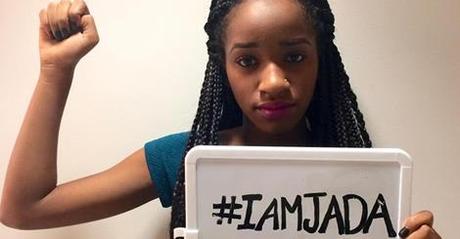A few weeks ago, Jada, a 16-year-old girl from Houston, Texas, went to a house party and was given a drink by the host. Little did she know that the drink was drugged, and that she would wake up later with no memories of what had just happened.
After Jada went unconscious, she was raped. The rape was recorded via pictures and videos, which were then put on social media. When Jada woke up later she had no idea what had just happened to her. That is, until she checked social media and found alarming tweets, pictures and videos. In a horrific turn of events, her assault was then turned into a meme, where people mimicked her pose– unconscious, sprawled out on the floor, partially unclothed– and then took a picture and posted it to Twitter with the hashtag #JadaPose. This hashtag started in Houston, went viral and quickly spread. Jada’s rapist (whose account has now been deleted) also took to Twitter to harass her, bragging about the event and directing slurs at her. Very quickly, a young girls horrific assault became an internet sensation.
A girl goes to a party, is drugged and raped, and then is shamed and blamed: it’s a narrative that’s far too common — last year’s Steubenville case is another high-profile example. These events illustrate, among other things, two major problems in our society: the complete dehumanization and objectification of women’s bodies, and the way rape is joked about and taken lightly. No one at the party attempted to intervene, numerous people recorded the assault, and even more joked about it on Twitter. None of these people stopped to think about what was happening, what they were doing. The way we talk (or don’t talk) about rape, the way it’s casually joked about, and the way we talk about and treat rape survivors all cause people to take it less seriously. The way we talk about both masculinity (and violent masculinity specifically) and the way we talk about women cause boys to think they’re entitled to women’s bodies. Our society’s dominant narratives allow things like this to happen.
In our society, the humanity of young girls– black girls especially– is not respected. In Jada’s case, extreme amounts of both racism and sexism, and the intersection between the two still prevalent in our culture, allowed her to be the object of assault and mockery. She was dehumanized to the point where her body existed solely as an object to her rapist, the other people at the party and everyone who participated in #JadaPose. She was robbed of her agency, severely violated, and then mocked.
But Jada and her supporters are fighting back. After the event, Jada appeared on her local news station to speak out instead of remaining anonymous. In her interview with KHOU 11 News, she said “There’s no point in hiding. Everybody has already seen my face and my body, but that’s not what I am and who I am.” She also used Twitter, where the majority of her online abuse had taken place, to post a picture of herself holding a sign saying #IAmJada, effectively putting a face to her story and reclaiming her humanity. Her supporters are tweeting words of both encouragement and outrage, and pictures of themselves in Jada’s #IAmJada pose, with hashtags like #StandWithJada, #JusticeForJada and #JadaCounterpose.
This is a horrific story, but one that’s all too familiar. Hopefully if enough people stand up and express their outrage, if brave survivors like Jada continue to speak out, and enough voices actively oppose racism, sexism, rape and the notion of violent masculinity, the ingrained societal narratives that allow these things to happen can and will change.


